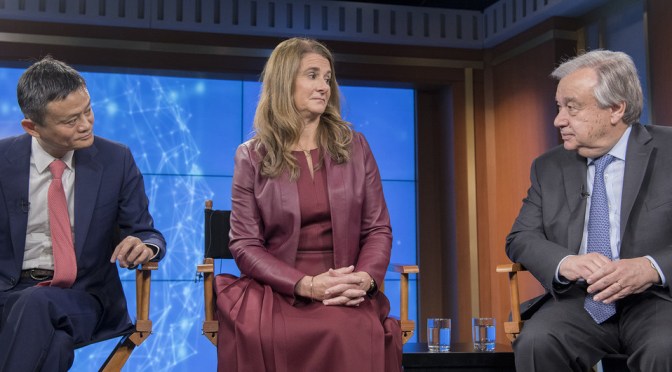ANALYSIS
Two years after the approval of Operational directives on the implementation of the Convention in the digital environment, the UN Secretary-General’s High-level Panel on Digital Cooperation, launches the report entitled “The Age of Digital Interdependence“. Presented on June 10th 2019, this report calls for greater cooperation to make sure that the benefits of digital technology reach all of humanity while addressing a range of pressing associated challenges. It brings more hopes and is highly supportive of the implementation of UNESCO’s 2005 Convention for the Protection and Promotion of the Diversity of Cultural Expressions, as its recommendations are fully in line with the operational guidelines to implement the 2005 Convention, approved at the Sixth ordinary Session of the Conference of the Parties in June 2017. In fact, the two documents share the same guiding principles for advocating the same approaches in terms of digital governance, the role of stakeholders and the interactions between them for inclusive and sustainable digital exploitation.
The guiding principles: a common, inclusive and sustainable digital environement
The High-level Panel’s report starts from the fundamental principles according to which no one should be left behind in the digital age, and that digital cooperation and technology can contribute to achieving the Sustainable Development Goals. These principles align with the statement that the differences in the rate at which digital technologies are adopted and accessed around the world create a digital divide between and within countries and between women and men as well as urban and rural areas, in both developed and developing countries. That digital divide impacts the way how cultural goods and services are created, produced, distributed and accessed (operational guideline N° 4). Therefore, emphasising on the fact that roughly half the world’s population still lacks internet access or is using only a fraction of its potential despite being connected, the report advocates the building of an inclusive digital economy and society.
Garanteeing human rights in a continuously digitalized world
The High-level Panel stresses the problem of harmful content online and mainly on social media, challenges to user’s privacy, and the importance of trust and stability of the digital environment. These are such issues related to human rights, human agency, trust and security in the digital age that led to the second recommendation of the Panel advocating for human rights and human agency. In that line, the operational guidelines of the 2005 Convention emphasised on the protection and promotion of human rights and the freedom of creation, expression, information and communication in the digital environment by “supporting the principles of Internet universality that promote a Human Rights-based open Internet, which is accessible to all and characterized by multi-stakeholder participation” (operational guideline N° 4). The Panel just reinforced this measure by calling for more effective action to prevent trust and stability from being eroded by the proliferation of irresponsible uses of cyber capabilities, as well as a design of autonomous intelligent systems such that their decisions can be explained and humans are accountable for their use, in terms of artificial intelligence.
Digital governance through a multistakeholder and interdependent approach
Analyzing the digital environment and the statutes of its stakeholders, the Panel has given guidelines and recommendations to ensure cohesive, inclusive digital cooperation based on the interoperability and the interdependence. This will be as beneficial to the diversity of cultural expressions as it is to other areas of the economy of each Party to the 2005 Convention. The statements related to this aspect in the Operational Directives are mainly in points 24, 25 and 26, which relate in particular to support measures for developing countries, the role of civil society, the collection and sharing of information and best practices within the stakeholder system. Specifically, the Panel proposes a multi-stakeholder approach to digital cooperation and then regulations that include and adapt to the requirements and characteristics of the digital age. The development of cultural policies by the Parties to the Convention could follow this approach in order to integrate best practices from the upstream.
Furthermore, the launch of the Panel’s report included a “declaration of digital interdependence” outlining the Panel’s belief that cooperation in the digital space is paramount, as individuals, institutions, corporations and governments cannot manage digital developments alone, and that global aspirations and vulnerabilities are “deeply interconnected and interdependent”. Lastly, the Panel calls for a building of an interdependent connected world, that will benefit all the stakeholders through cooperation, participation, dialogue and concerted action.
The implementation of these recommendations by the Parties of the 2005 Convention will be mutually beneficial for both cultural actors in terms of professional deployment and for the establishment of a better dynamic of our diverse cultural expressions in the age of digital interdependence.


very interesting
LikeLike